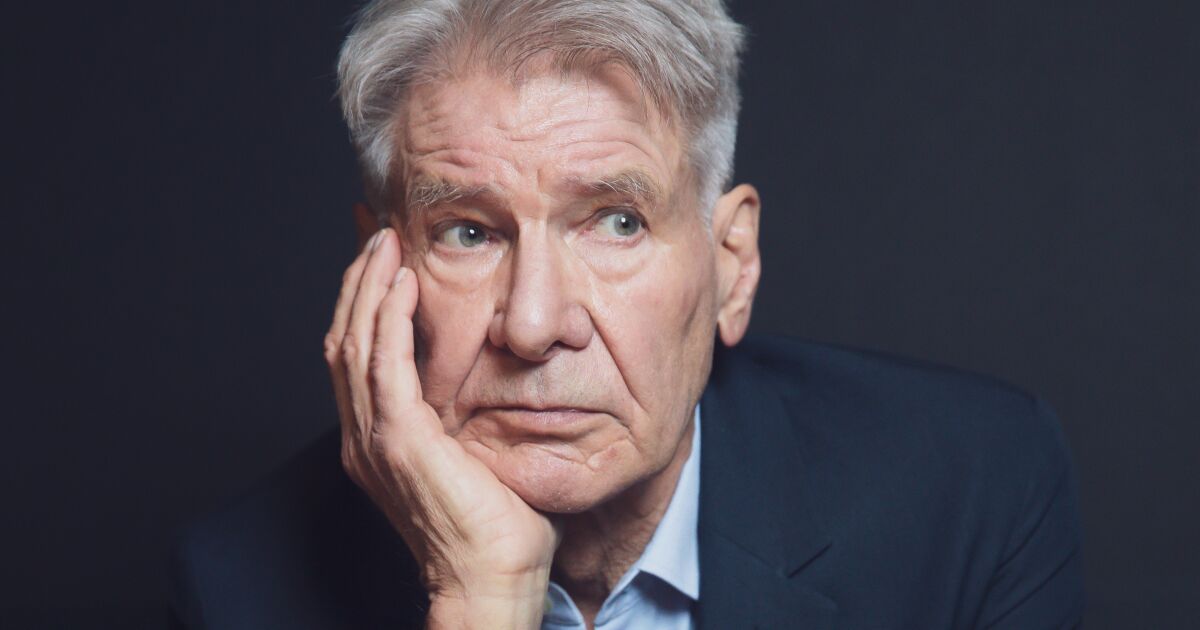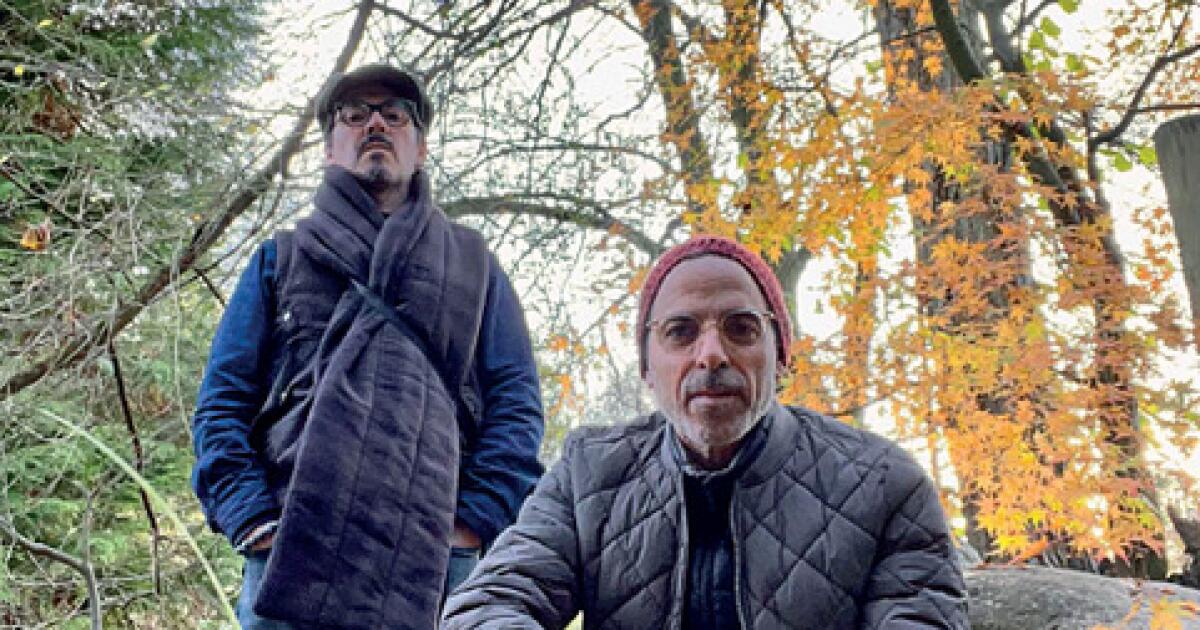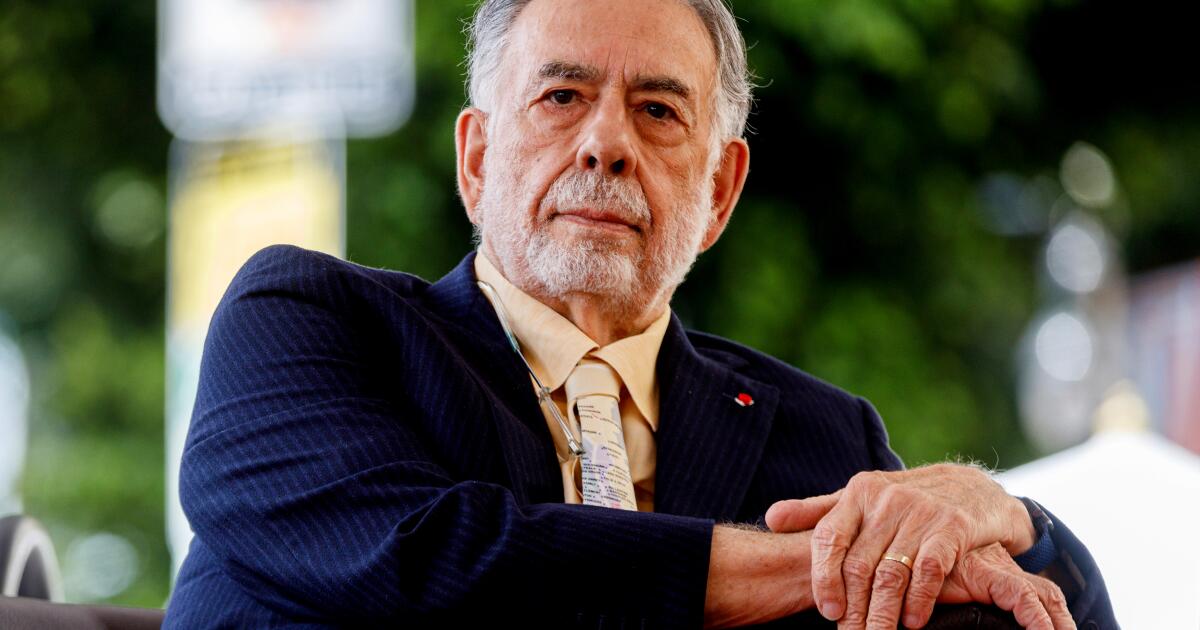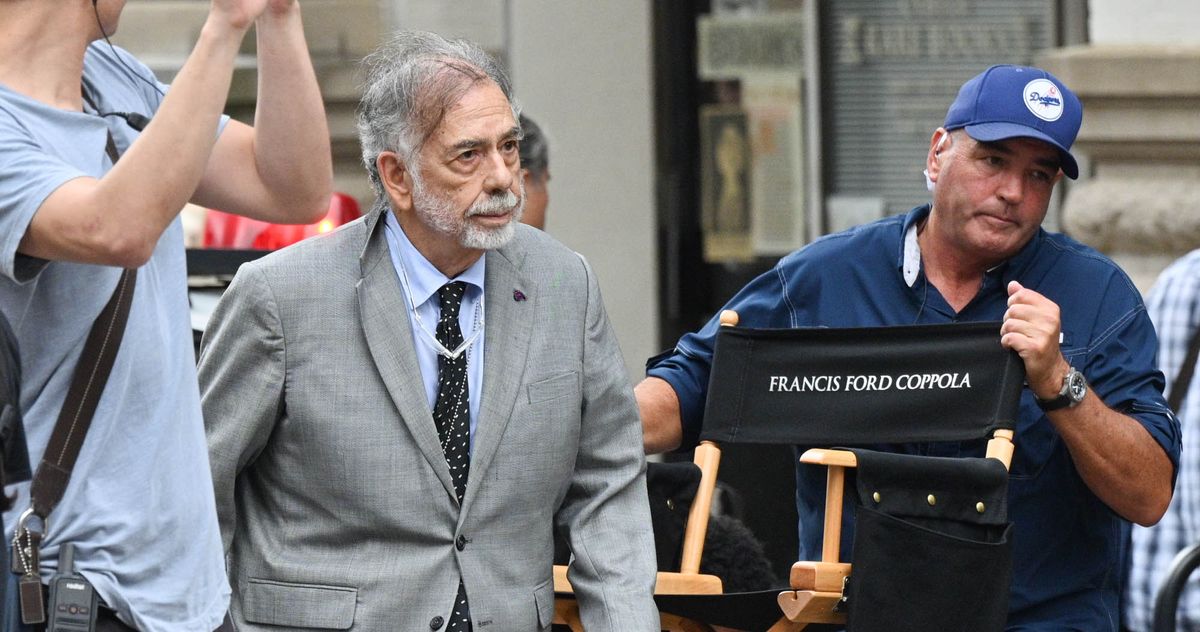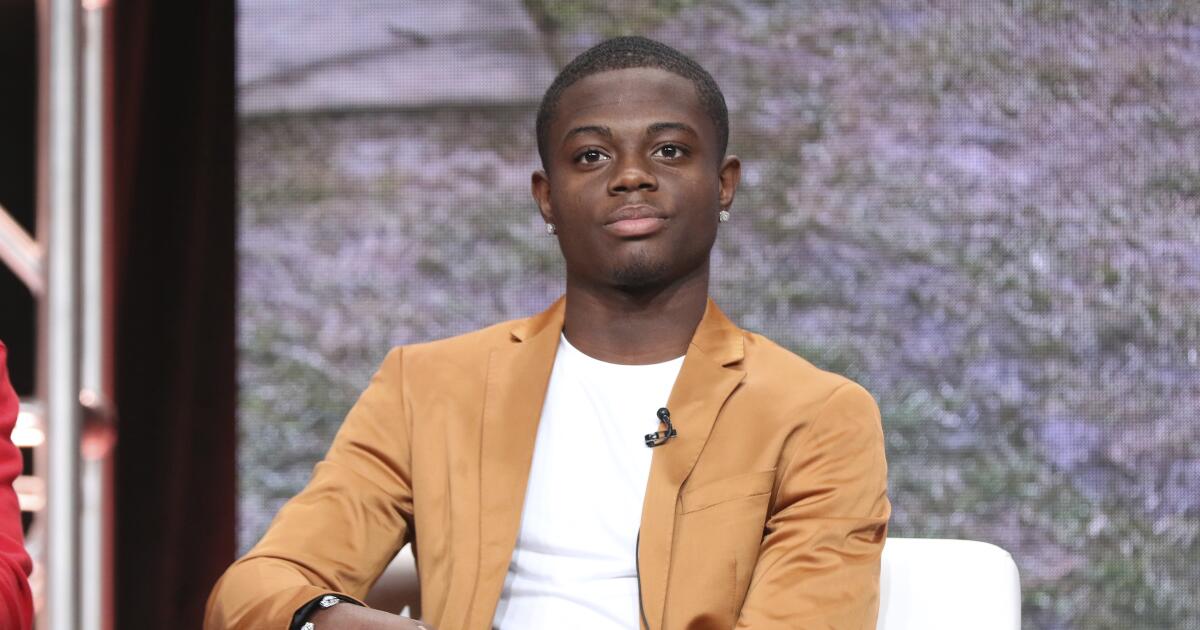Harrison Ford is photographed at The London Hotel in West Hollywood on June 14, 2023.
(Christina House / Los Angeles Times)
Is Harrison Ford trying to make the rest of us look bad?
I say this as someone who has loved the actor since childhood and has watched every movie he’s ever made for the simple reason that he was in them.
But come on. The guy’s 80, and instead of sliding into the traditional role of lifetime achievement award winner, memoir writer and maker of occasional cameo appearances, he’s back on billboards and the sides of buses for “Indiana Jones and the Dial of Destiny.”
Meanwhile his roles in “1923” and “Shrinking” could very well deliver not only his first Emmy nomination but his second as well.
Oh, and he just finished shooting his first Marvel movie, “Captain America: Brave New World,” in which he plays American President Thaddeus “Thunderbolt” Ross (a role formerly filled by the late, great William Hurt), who may or may not turn out to be the Red Hulk.
Who does he think he is, Jane Fonda?
For a few years Ford did seem to be winding down. He turned up as Han Solo (almost) one last time, to nostalgic audience delight, in “Star Wars: Episode VII — The Force Awakens” and made a third-act reprise of his character Decker in “Blade Runner: 2049.”
Otherwise, the man who for years was Hollywood’s top-grossing actor appeared content to fly his planes, support his causes and hang out with wife Calista Flockhart on their ranch.
Though the fifth Indiana Jones film may have been in the works when COVID-19 shut the world down, none of the fevered prognostications about how the entertainment industry would rebound predicted a full-on Harrison Ford renaissance.
But when Hollywood went back to work, so did Ford.
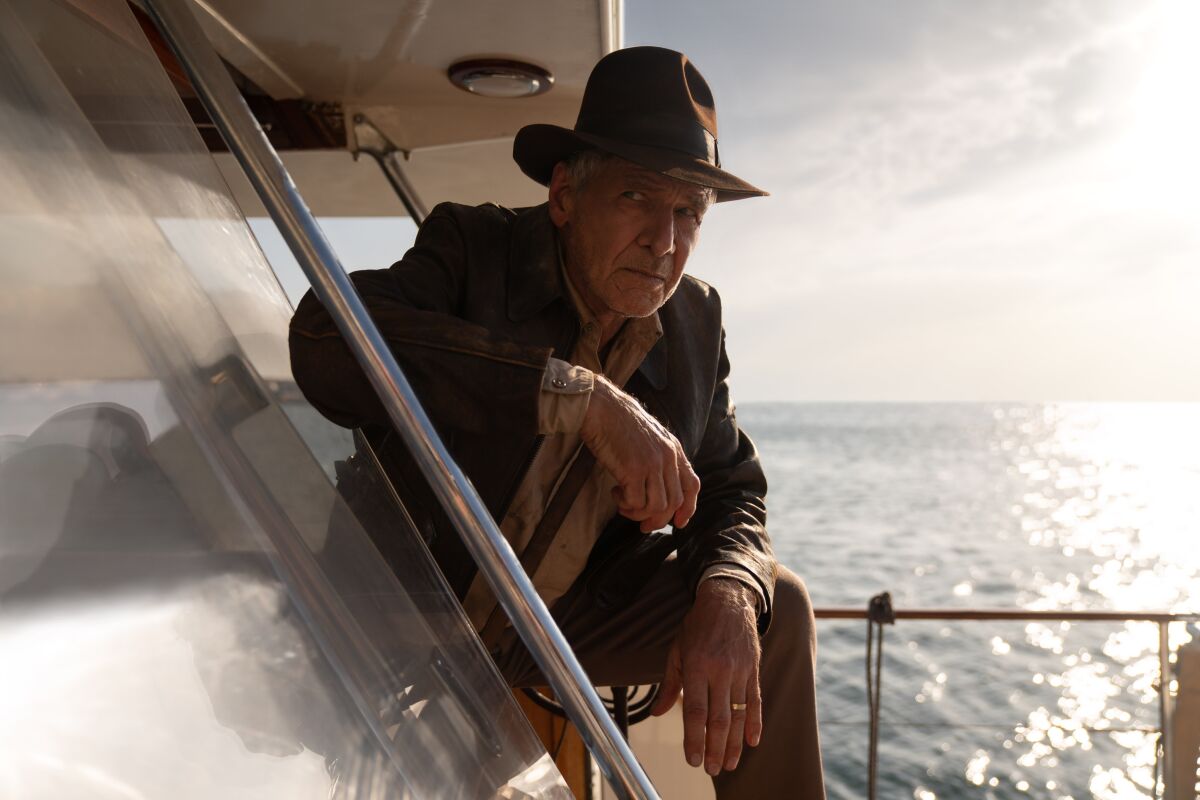
Harrison Ford in “Indiana Jones and the Dial of Destiny”
(Lucasfilm Ltd.)
“I like to work,” Ford told journalists at the Cannes Film Festival, where “Dial of Destiny” premiered in May. It was a classic Fordian understatement — all that was missing was an f-bomb.
Many of Ford’s octogenarian peers — Fonda, Judi Dench, Al Pacino — are still working, but none of them, with the exception of President Joe Biden, are currently working as hard as Ford. Never mind the scenes on horseback, the fist fights, the inter-vehicle jumping and the cliff/cave clambering that any Indiana Jones film requires. The publicity surrounding “Dial of Destiny” alone is enough to put a younger man than Ford on bed rest.
The actor may have a reputation for carefully guarded privacy, which is inevitably mentioned in any story about him, but he knows how the business works: The stars need to show up to sell the picture. And in the past six months, he has done nothing but show up. For the festivals, panels and interviews, for the photo shoots and the junkets.
At Cannes, crowds outside and inside the Grand Palais theater began cheering the moment his silvery head emerged from the limo. Some may have felt that the standing ovation there for “Dial of Destiny” wasn’t long enough to declare the film a hit, but perhaps everyone’s hands were tired from the multiple ovations they had already given Ford, before and after he received an honorary Palme d’Or.
He wept. The audience wept. It was a lot.
“It was Cannes,” he said wryly a few weeks later, dropping his voice to gravelly depth on “Cannes” before twitching up that famous grin. “It’s actually fantastic. The French have a deep appreciation for and history of film. They are quite generous and responsive to all manner of film, not just, as you might suspect, art film. And this is not art film. This is family film. This is a popcorn movie. With special sauce,” he said, adding, “and that special sauce is unexpected, unanticipated true emotion.”
It is the day after the American premiere of “Dial of Destiny,” and to say that Ford is in full publicity mode does not even begin to describe it. The hotel room in which we spoke had been dressed, presumably for video interviews, in full Indiana Jones, down to a curled-up bullwhip and the hat.
Ford waved away the half-dozen people who hung at the edges of the room: “Go, go, no one needs to hear all this.” “Forty-five minutes,” a young woman repeated, reminding me of the time that I had.
“This is junket time,” he said, cracking open a water. “Day five. No, longer than that. Way longer than that.”
A movie star for almost half a century, Ford is a canny interview subject. He knows it’s work, both his and the reporter’s, and he is respectful of that. But he is not there to exchange chatty confidences or explore his fears and motivations beyond the topic at hand. Which is the work.
It’s no wonder profile writers invariably begin their pieces with confessions of anxiety; Ford does not need to be surrounded by Indiana Jones memorabilia to stay on topic.

Actor Harrison Ford is photographed at The London Hotel in West Hollywood on June 14, 2023.
(Christina House / Los Angeles Times)
That said, his desire for “Dial of Destiny” to succeed feels quite personal.
“I wanted to be ambitious, for those things we have not necessarily done in such measure,” he said. When asked what he means by “those things,” he explains in that instantly recognizable, back-straightening “take this seriously” tone. “I mean take a chance on telling the story of an older character, take a chance on introducing your character in present day in a totally anti-iconic way, reducing him to his underwear and a La-Z-Boy with a glass in his hand.
“That moment in film,” he says, relaxing into a laugh, “may be one of my favorite things I’ve ever done in a movie. That and grabbing a baseball bat and going out to the neighbors’.”
Unique among actors, Ford has brought three of his action heroes into more mature years, and he defends the pattern.
“Someone did ask me if I was going to remake every f— film I’d ever made,” he said. “And I said, ‘Yes. Why not? It’s my job.’”
He isn’t, of course; there’s no Jack Ryan-as-elder-statesman in the works, no plans to check in on Jack and Tess from “Working Girl.”
Also, once again and for anyone sitting in the back row, this is Indy’s last adventure. “I won’t be going back as Indy,” he said. Not even as a ghost.
Based in part on the heroes of 1950s adventure films, beloved of both George Lucas and Steven Spielberg, Indiana Jones was always going to be the center of a serial, and five was a number that Lucas floated for years. After “Indiana Jones and the Kingdom of the Crystal Skull,” Ford had thoughts about where, and when, the character could go, but he says he was not key in the early development of “Dial of Destiny.”
“I don’t work that way,” he said. “I work off the page and in the room where it happens. Jim Mangold [who replaced Spielberg as director] and I worked together on reshoots on [2020’s] ‘Call of the Wild’ — we spent two months figuring out what to do while we were waiting for my beard to grow in. His ambitions and my ambitions are very close [but] I do not require people to do what I want. I want the script to take me someplace I have not been before.”
Mostly, he said, he wanted to see Indy “inveigled into one last adventure. I wanted to see him at the nadir, where we could pick him up and kick him in the ass. I know what age is about. I wanted to bring that into the story. If I was going to be the actor playing this guy, I wanted the reality of my age.”
But first, in the film’s opening scene, he had to play a younger Indy, which made the contrast of past and present more striking. Ford’s face was de-aged through the miracle of artificial intelligence and Lucasfilm’s trove of images from the earlier films, but “the mouth is my mouth, the eyes are my eyes,” he said. “The voice is me talking in a higher register because age lowers the voice, and the body language I had to act. But he moves like I move and I remembered.”
More important, he remembered what made an Indiana Jones film, even though it is a type that is increasingly rare.
“This is a family film like all the rest of them. They’ve been passed on generationally,” he said. “Sharing these kinds of stories with your children is a great opportunity — not my children, because they know how the sausage is made — but other children.”

Harrison Ford in “Indiana Jones and the Dial of Destiny”
( Lucasfilm Ltd. )
Action without gore, threat without high body counts; this story, he said, “is about the Nazis being part of the space program, about a moment in time in America when things were shifting from black-and-white to shades of gray. Same time of civil rights and youth movement and it’s not his time. Which is fun and a little uncomfortable. It’s the missing middle,” he says. ”We are stuffed to the edges now. Not a lot of films are being made for a family to watch together.”
Ford said he returned to our screens, large and small, not from fear of mortality or any desire for a personal renaissance but because he “ran into a vein of very good writing and I did not walk away from it. I embraced it and said, ‘I want this.’”
Neither was his return to television — where he began his career in small parts on classic shows including “The Mod Squad,” “Ironside” and “Love, American Style” — part of a larger strategy. “I hadn’t even thought about it before,” he said. “I don’t know why we call it television except that that’s where we show it. ‘1923’ is built for the big screen. The genius is that they are able to jam all that magic into the small screen and still keep the majesty.”
Ford was one of the last studio contract players; with his entrance into streaming via “Shrinking,” his career has taken him through some of the biggest changes the entertainment industry has seen. Changes that have led to this year’s summer of unrest, with the writers’ strike in its second month and the real possibility of actors following suit.
“There needs to be greater equity,” said Ford. “This issue of not being able to discover what the profit schedule is and how to equitably share it is because of the secrecy, the lack of transparency. No one is speaking the same language. The streamers all have their own accounting system.”
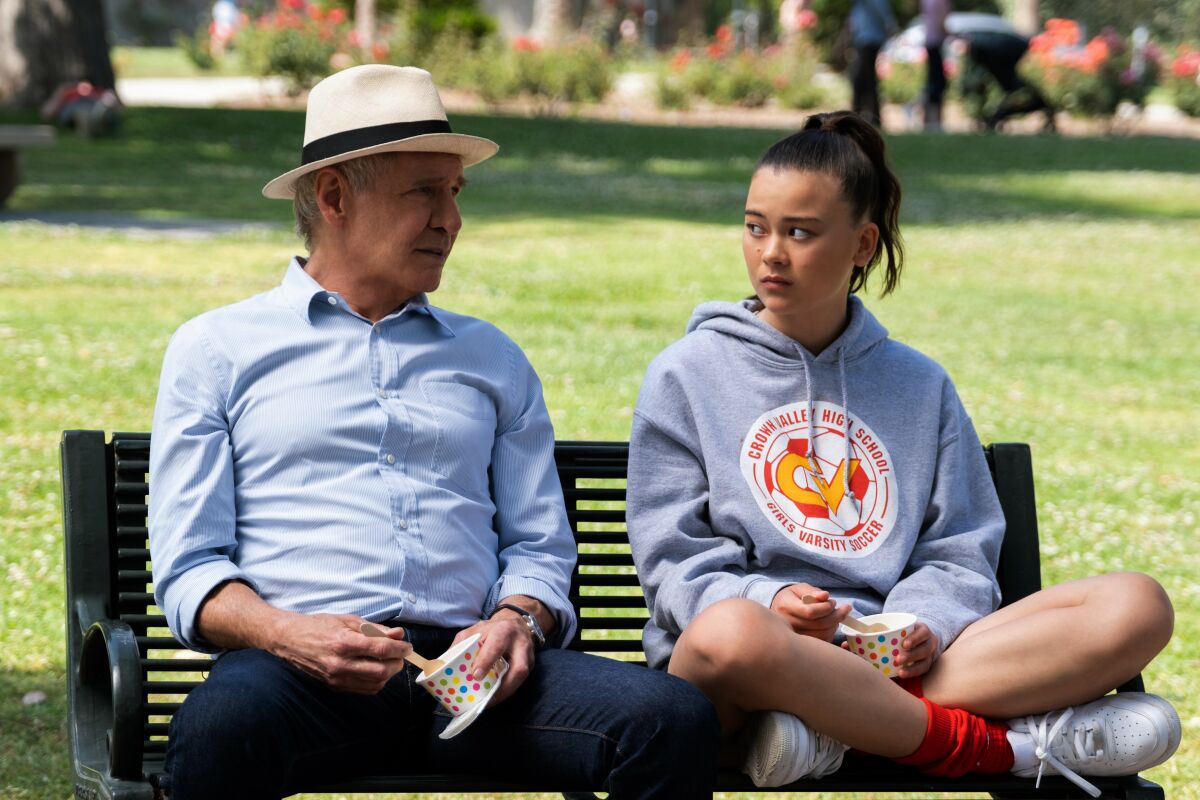
Harrison Ford and Lukita Maxwell in “Shrinking”
(Apple TV+)
“I have thoughts about labor unions in general,” he added. “Especially for craft guilds. I understand craft guilds, but that includes the responsibility of the guilds to establish a pathway to journeymanship. We don’t do that anymore.” He begins to continue, then stops. “You’re going to get me into f— trouble. I think a lot about it,” he said, “but a lot of it is my being raised Democrat. At my core, I believe in equity for labor and equality. But that’s not what we’re here for.”
At least it’s not what he’s here for. As the rustic lantern standing just behind Ford’s left shoulder reminds me, he’s here to talk about “Dial of Destiny,” a film that may or may not be setting up a potential spinoff for Indy’s treasure-marketing goddaughter, Helena, played by Phoebe Waller-Bridge.
Making her action-hero debut beside Harrison Ford required as much if not more bravery than anything her character attempted, including stealing the titular dial from Indiana Jones. But “she threw herself into it,” he said — without asking his advice. “I don’t think she wanted to know how to do it. She wanted to just do it and suffer the consequences of not knowing how to do it, ’cause that’s Helena’s character and it’s also Phoebe’s character.”
Not that he’s much of an advice giver anyway. “My only advice ever is don’t try to imitate anybody else’s success. Figure out how to do it yourself, using what you naturally have.”
When pressed about what he “naturally” has, Ford is surprisingly vague. He is historically, and currently, unabashed about his love for acting, and over the years directors and co-stars have consistently praised his preparedness, attention to detail and desire to be part of every level of the filmmaking process.
But, he said, when he was recently asked about his process for achieving a certain emotion in “Air Force One,” he said he had no real answer. “I don’t know. It happens to me. In the same way in Cannes, emotion happened. Other actors are making it happen to me, the script is helping get me where I’m going to go, but where it’s going to go, I have no f— idea. I listen to whatever everybody says and then … but I love what I do, I think that’s a big part of it. There’s no part of it I don’t love.
“I think there’s all kind of ways to be an actor. I don’t know any of them except my own. I’m not playing a hero, I’m playing an archaeologist, I’m playing a doctor, I’m playing a Russian submarine captain.”

Harrison Ford and Andrew Divoff in “Air Force One”
(Columbia Pictures)
And that may be the answer to the whole thing. Harrison Ford has always been in the business of making ordinary mortals look bad. Or, taking a more positive approach, of telling stories in which relatively ordinary people do extraordinary things: He is just your average, good-looking guy who finds himself forced, by all manner of events beyond his control, to fight stormtroopers, fascists, terrorists, corrupt officials and evil pharmaceutical executives in order to save the world, his family or his reputation — and see justice done.
At home in a galaxy far, far away, Nazi-controlled Europe, a Russian submarine or current and future America, he has moved through space and time with the ease of “Doctor Who’s” famous Time Lord, a character who has been played by 13 actors.
But there is only one Harrison Ford, and there will never be another like him. Setting aside his talent, Hollywood is no longer capable of creating a career like Ford’s, a journeyman actor with a movie-star smile who loves what he does but understands that it is work.
Why has he decided to throw himself back into the business and make us all reconsider our own retirement plans? Because he can.
As for his next film, he may be Harrison Ford, but like every member of the Marvel universe he is bound to secrecy. “I had a good time, it’s just a different kind of movie. I saw actors that I admire having real fun, chewing it up, and I said, ‘Give me some of that. I’ll have one of those, thank you, if there are any left.’ And there was.”
When it is pointed out to him that the Marvel gig means he will now be part of not one, not two, but three areas of Disneyland, he laughs. “There’s an Avenger ride? Well, I’m not an Avenger. I play the president of the United States, so I probably won’t be part of that.”
He claims to have never gone on either the Indiana Jones ride — ”Why would I do that? Would you go on a Mary McNamara ride?” (um, yes, repeatedly) — or Millennium Falcon: Smuggler’s Run. He did show up, along with George Lucas, Billy Dee Williams and Mark Hamill, for the opening of Galaxy’s Edge in 2019 but, he said, “When Bob Iger asked me if I wanted to go on the ride I said” — he growls in the negative. “He still looks at me sideways.”
When I tell him the last time I was at Disneyland, Indiana Jones broke down twice while we were in line, he laughs. “Hey, I break down too sometimes.”
I wonder if this is his way of saying we’re done.
Ford admits that doing publicity, including this interview, is not his favorite part of the work. “I’m in it for the money, and I mean that in the best possible way,” he said. “I want my films to succeed. For me and for all the people who work on them, even the people who put money in. But mostly I want the films to succeed for the audience. Because that is why we tell stories.”

Actor Harrison Ford is photographed at The London Hotel in West Hollywood on June 14, 2023.
(Christina House/ Los Angeles Times)
The he reached down and touched my phone, which was on a small table between us, recording the conversation. “Sorry,” he said, pulling his hand back. “I thought it was mine. Oh, look at that,” he said as the screen illuminated to show how long the interview had run. “Forty-five minutes. ‘Did he touch it accidentally or did he just know?’” He laughed out loud.
“Be sure you write that down.”




